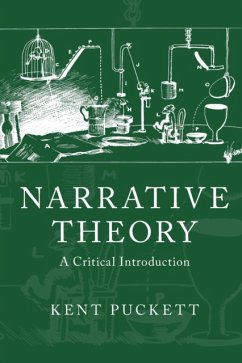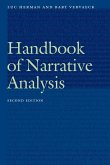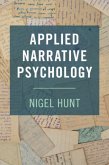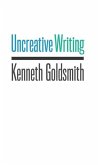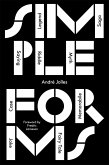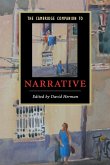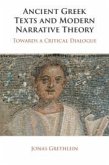Kent Puckett (Berkeley University of California)
Narrative Theory
Kent Puckett (Berkeley University of California)
Narrative Theory
- Broschiertes Buch
- Merkliste
- Auf die Merkliste
- Bewerten Bewerten
- Teilen
- Produkt teilen
- Produkterinnerung
- Produkterinnerung
Kent Puckett's Narrative Theory offers readers an introduction to the field's key figures, methods and ideas, and it also reveals that field as unexpectedly central to the history of ideas by providing an account of a methodology of narrative increasingly central to literary studies, film studies, history, psychology and beyond.
Andere Kunden interessierten sich auch für
![Handbook of Narrative Analysis Handbook of Narrative Analysis]() Luc HermanHandbook of Narrative Analysis38,99 €
Luc HermanHandbook of Narrative Analysis38,99 €![Literature and Medicine Literature and Medicine]() Literature and Medicine117,99 €
Literature and Medicine117,99 €![Applied Narrative Psychology Applied Narrative Psychology]() Nigel Hunt (University of Nottingham)Applied Narrative Psychology32,99 €
Nigel Hunt (University of Nottingham)Applied Narrative Psychology32,99 €![Uncreative Writing Uncreative Writing]() Kenneth GoldsmithUncreative Writing29,99 €
Kenneth GoldsmithUncreative Writing29,99 €![Simple Forms Simple Forms]() Andre JollesSimple Forms22,99 €
Andre JollesSimple Forms22,99 €![The Cambridge Companion to Narrative The Cambridge Companion to Narrative]() David Herman (ed.)The Cambridge Companion to Narrative52,99 €
David Herman (ed.)The Cambridge Companion to Narrative52,99 €![Ancient Greek Texts and Modern Narrative Theory Ancient Greek Texts and Modern Narrative Theory]() Jonas Grethlein (Germany Ruprecht-Karls-Universitat Heidelberg)Ancient Greek Texts and Modern Narrative Theory28,99 €
Jonas Grethlein (Germany Ruprecht-Karls-Universitat Heidelberg)Ancient Greek Texts and Modern Narrative Theory28,99 €-
-
-
Kent Puckett's Narrative Theory offers readers an introduction to the field's key figures, methods and ideas, and it also reveals that field as unexpectedly central to the history of ideas by providing an account of a methodology of narrative increasingly central to literary studies, film studies, history, psychology and beyond.
Produktdetails
- Produktdetails
- Verlag: Cambridge University Press
- Seitenzahl: 360
- Erscheinungstermin: 7. November 2016
- Englisch
- Abmessung: 228mm x 151mm x 25mm
- Gewicht: 504g
- ISBN-13: 9781107684744
- ISBN-10: 1107684749
- Artikelnr.: 45156184
- Herstellerkennzeichnung
- Libri GmbH
- Europaallee 1
- 36244 Bad Hersfeld
- gpsr@libri.de
- Verlag: Cambridge University Press
- Seitenzahl: 360
- Erscheinungstermin: 7. November 2016
- Englisch
- Abmessung: 228mm x 151mm x 25mm
- Gewicht: 504g
- ISBN-13: 9781107684744
- ISBN-10: 1107684749
- Artikelnr.: 45156184
- Herstellerkennzeichnung
- Libri GmbH
- Europaallee 1
- 36244 Bad Hersfeld
- gpsr@libri.de
Kent Puckett is an Associate Professor of English at the University of California, Berkeley. He is author of Bad Form: Social Mistakes and the Nineteenth-Century Novel (2008) and War Pictures: Cinema, History, and Violence in Britain, 1939-1945 (forthcoming).
1. Introduction: story/discourse
2. Action, event, conflict: the uses of narrative in Aristotle and Hegel
2.1. Beginning, middle, and end: Aristotle and narrative
2.2. Tragedy, comedy, and the cunning of reason: Hegel and narrative theory
3. Lost illusions: narrative in Marx, Nietzsche, and Freud
3.1. First as tragedy: Karl Marx, narrative, and revolution
3.2. Beyond story and discourse: Friedrich Nietzsche and the limits of narrative
3.3. Narrative and its discontents: Sigmund Freud's story
4. Epic, novel, narrative theory
4.1. Relations stop nowhere: Henry James and the novel's narrative
4.2. Starry maps: Georg Lukács and the comparative analysis of narrative genres
4.3. To kill is not to refute: Mikhail Bakhtin on genre, narrative, and history
4.4. History's scar: Erich Auerbach and narrative thinking
5. Form, structure, narrative
5.1. The hero leaves home: Vladimir Propp and narrative morphology
5.2. Knight's move: Viktor Shklovsky and Russian Formalism
5.3. Differences without positive terms: Ferdinand de Saussure and the Structuralist turn
5.4. The elementary structures of story and discourse: Claude Lévi-Strauss and the narrative analysis of myth
6. Narratology and narrative theory: Kristeva, Barthes, and Genette
6.1. It is what it isn't: Julia Kristeva and Tel Quel
6.2. Parisian gold: Roland Barthes and narrative pleasure
6.3. The knowable is at the heart of the mysterious: Genette's narrative poetics.
2. Action, event, conflict: the uses of narrative in Aristotle and Hegel
2.1. Beginning, middle, and end: Aristotle and narrative
2.2. Tragedy, comedy, and the cunning of reason: Hegel and narrative theory
3. Lost illusions: narrative in Marx, Nietzsche, and Freud
3.1. First as tragedy: Karl Marx, narrative, and revolution
3.2. Beyond story and discourse: Friedrich Nietzsche and the limits of narrative
3.3. Narrative and its discontents: Sigmund Freud's story
4. Epic, novel, narrative theory
4.1. Relations stop nowhere: Henry James and the novel's narrative
4.2. Starry maps: Georg Lukács and the comparative analysis of narrative genres
4.3. To kill is not to refute: Mikhail Bakhtin on genre, narrative, and history
4.4. History's scar: Erich Auerbach and narrative thinking
5. Form, structure, narrative
5.1. The hero leaves home: Vladimir Propp and narrative morphology
5.2. Knight's move: Viktor Shklovsky and Russian Formalism
5.3. Differences without positive terms: Ferdinand de Saussure and the Structuralist turn
5.4. The elementary structures of story and discourse: Claude Lévi-Strauss and the narrative analysis of myth
6. Narratology and narrative theory: Kristeva, Barthes, and Genette
6.1. It is what it isn't: Julia Kristeva and Tel Quel
6.2. Parisian gold: Roland Barthes and narrative pleasure
6.3. The knowable is at the heart of the mysterious: Genette's narrative poetics.
1. Introduction: story/discourse
2. Action, event, conflict: the uses of narrative in Aristotle and Hegel
2.1. Beginning, middle, and end: Aristotle and narrative
2.2. Tragedy, comedy, and the cunning of reason: Hegel and narrative theory
3. Lost illusions: narrative in Marx, Nietzsche, and Freud
3.1. First as tragedy: Karl Marx, narrative, and revolution
3.2. Beyond story and discourse: Friedrich Nietzsche and the limits of narrative
3.3. Narrative and its discontents: Sigmund Freud's story
4. Epic, novel, narrative theory
4.1. Relations stop nowhere: Henry James and the novel's narrative
4.2. Starry maps: Georg Lukács and the comparative analysis of narrative genres
4.3. To kill is not to refute: Mikhail Bakhtin on genre, narrative, and history
4.4. History's scar: Erich Auerbach and narrative thinking
5. Form, structure, narrative
5.1. The hero leaves home: Vladimir Propp and narrative morphology
5.2. Knight's move: Viktor Shklovsky and Russian Formalism
5.3. Differences without positive terms: Ferdinand de Saussure and the Structuralist turn
5.4. The elementary structures of story and discourse: Claude Lévi-Strauss and the narrative analysis of myth
6. Narratology and narrative theory: Kristeva, Barthes, and Genette
6.1. It is what it isn't: Julia Kristeva and Tel Quel
6.2. Parisian gold: Roland Barthes and narrative pleasure
6.3. The knowable is at the heart of the mysterious: Genette's narrative poetics.
2. Action, event, conflict: the uses of narrative in Aristotle and Hegel
2.1. Beginning, middle, and end: Aristotle and narrative
2.2. Tragedy, comedy, and the cunning of reason: Hegel and narrative theory
3. Lost illusions: narrative in Marx, Nietzsche, and Freud
3.1. First as tragedy: Karl Marx, narrative, and revolution
3.2. Beyond story and discourse: Friedrich Nietzsche and the limits of narrative
3.3. Narrative and its discontents: Sigmund Freud's story
4. Epic, novel, narrative theory
4.1. Relations stop nowhere: Henry James and the novel's narrative
4.2. Starry maps: Georg Lukács and the comparative analysis of narrative genres
4.3. To kill is not to refute: Mikhail Bakhtin on genre, narrative, and history
4.4. History's scar: Erich Auerbach and narrative thinking
5. Form, structure, narrative
5.1. The hero leaves home: Vladimir Propp and narrative morphology
5.2. Knight's move: Viktor Shklovsky and Russian Formalism
5.3. Differences without positive terms: Ferdinand de Saussure and the Structuralist turn
5.4. The elementary structures of story and discourse: Claude Lévi-Strauss and the narrative analysis of myth
6. Narratology and narrative theory: Kristeva, Barthes, and Genette
6.1. It is what it isn't: Julia Kristeva and Tel Quel
6.2. Parisian gold: Roland Barthes and narrative pleasure
6.3. The knowable is at the heart of the mysterious: Genette's narrative poetics.

